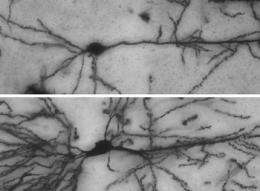How nerve cells grow: Researchers decode a molecular process that controls the growth

Brain researcher Hiroshi Kawabe has discovered the workings of a process that had been completely overlooked until now, and that allows nerve cells in the brain to grow and form complex networks. The study shows that an enzyme which usually controls the destruction of protein components has an unexpected function in nerve cells: it controls the structure of the cytoskeleton and thus ensures that nerve cells can form the tree-like extensions that are necessary for signal transmission in the brain.
In order to be able to receive signals from other cells, nerve cells form complex extensions called dendrites (from the Greek 'dendron' meaning tree). The growth of dendrites in the human brain takes place mainly during late embryonic and infantile brain development. During this phase, dendrites, with a total length of many hundred kilometres, grow from the 100 billion nerve cells in our brain. The result is a highly-complex network of nerve cells that controls all bodily functions - from breathing to complicated learning processes.
In order that this incredible growth phase of brain development does not lead to chaos, the growth of the dendrites must be accurately controlled. In fact, a large number of signal processes control the direction and the speed of dendrite growth by influencing the structure of the cytoskeleton, which is inside the growing dendrite and responsible for its shape and extension.
The Göttingen-based brain researcher Hiroshi Kawabe has now discovered exactly how the growth of the cytoskeleton is controlled during the dendrite development. Using specially bred genetically engineered mice, the Japanese guest scientist, who conducts research at the Max Planck Institute for Experimental Medicine, discovered that the Nedd4-1 enzyme is essential for regular dendrite growth. Nedd4-1 is an enzyme that usually controls the degradation of protein components in cells by combining them with another protein called ubiquitin. The cell identifies these ubiquitinated molecules as "waste" and degrades them. In some cases, however, the ubiquitination does not lead to the degradation of the marked protein but changes its function instead.
Nedd4-1 prevents degradation of the cytoskeleton
Hiroshi Kawabe has now shown that the Nedd4-1 enzyme ubiquitinates a signal protein called Rap2, and thus prevents it causing the dismemberment of the cytoskeleton and the collapse of the dendrites. "As long as Nedd4-1 is active, the nerve cell dendrites can grow normally," reports Kawabe. "In its absence, the dendrite growth comes to a standstill and previously formed dendrites collapse, with dramatic consequences for the function of nerve cell networks in the brain." There are, however, probably a number of parallel operating signal paths which control the dendrite growth. This explains why nerve cells can also form dendrites without Nedd4-1 - albeit significantly fewer in number and shorter. The Nedd4/Rap2/TNIK mechanism would then be only one of several that can partially compensate each other.
Kawabe's discovery provides important new insight into the mechanisms which control the development of the brain. "What is surprising is that no-one has investigated this before," says the Japanese biochemist. Scientists have long been aware that Nedd4-1 is one of the most prevalent ubiquitination enzymes in nerve cells and is produced with great frequency in the developmental phase when nerve cells grow and form their dendrites. As Kawabe points out, the function of Nedd4-1 has already been investigated in dozens of studies. "But very little work has been carried out on its role in nerve cell development, which would have been the obvious thing to do."
More information: Kawabe, H., et al., Regulation of Rap2A by the ubiquitin ligase Nedd4-1 controls neurite development in cortical neurons. Neuron 65, 358-372 (2010)














